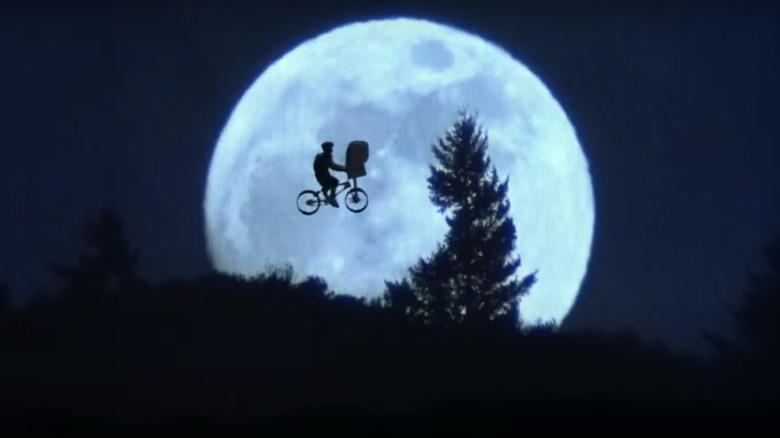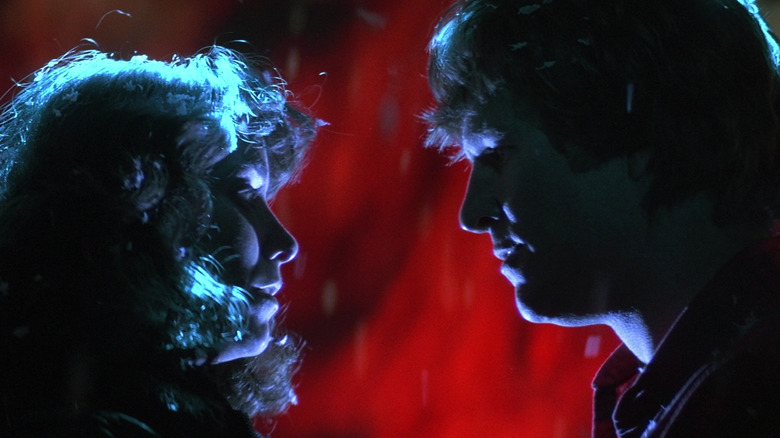What Happened To The Studio That Passed On Making E.T.?
In the heyday of the 1980s entertainment industry, huge blockbuster movies were the crème de la crème of filmmaking. At the top of the A-list was none other than "Jaws" mastermind Steven Spielberg. Spielberg was in his mid-30s in the early '80s, and, hot off the success of his 1977 film "Close Encounters of the Third Kind," was in search of his next picture to direct. Columbia Pictures wanted to hire Spielberg to direct the sequel to "Close Encounters," yet he was far from interested.
Columbia Pictures was the famous studio known for distributing some of the biggest hits of the '80s, such as "Ghostbusters" and "The Karate Kid," which were both released in June of 1983. Columbia was originally slated to distribute "E.T. the Extra-Terrestrial" (originally titled "Night Skies" and based on a much bleaker concept), but the studio envisioned a different direction for the story than what Spielberg wanted. It's quite often that the ideas of a director and studio clash and, because of other bumps in the road, it was clear as day that Columbia was not the right distributor for Spielberg's extraterrestrial story that grew into a warmhearted, child-friendly film about a boy who befriends an alien.
And then Universal Pictures stepped in.
There were challenges with Columbia early on
According to Den of Geek, Columbia had invested nearly $1 million in a development deal for "E.T." However, the studio's marketing department didn't believe that the film had enough potential to be a success amongst audiences. This ultimately ill-fated decision led to a "turnaround." In Hollywood, this is a term that means a studio has stopped production on a film and can give it over to another studio who was interested (in this case it was Universal Pictures), with the stipulation that the amount the previous studio put into the film would be repaid by them (per ScriptMag). Columbia did make a deal with Spielberg to profit off some of the earnings from the final product of the film, but it wasn't much at all.
Columbia had also been struggling financially. As noted by Den Of Geek, the production of "Close Encounters" had cost a pretty penny for a studio already facing bankruptcy. Passing on "E.T." would direly cost Columbia, not only for having zero faith in Spielberg's unique idea but also for missing out on what would become the fourth highest-grossing movie of all time when adjusted for inflation (via Filmsite).
From E.T. to Starman
With their sights set on another film called "Starman," Columbia said sayonara to "E.T." According to Nerdist, after having been in production for years, famed horror director John Carpenter (known for "Halloween," "The Fog," and "Escape from New York") became attached to the project in 1983. The movie starred Jeff Bridges about an alien who crashes on Earth inhabits the body of a woman's (Karen Allen) dead husband and ends up falling in love with her. In a review of the film by Roger Ebert, he commented that both "E.T." and "Starman" have similar themes, although "Starman" was essentially just a version of "E.T." for adults.
Both "Starman" and "E.T." are more alike than not. Per The Verge, each movie deals with an evil government trying to control "misunderstood beings" which is a common trope used in countless other science fiction films that succeeded them. Also, their plots tended to appeal to a more mainstream audience, they brought up questions related to how humans see aliens and made the audience root for the non-human being. However, even though "Starman" was somewhat successful, it didn't register as much with viewers who felt more sympathetic toward E.T. and the plight of him returning back to his home planet.
Despite the generally positive reviews of 1984's "Starman," little did Columbia know that they would be making the largest mistake in entertainment history. By giving up on "E.T.," the movie that would completely change the moviemaking landscape forever, Columbia never got the chance to phone home.


